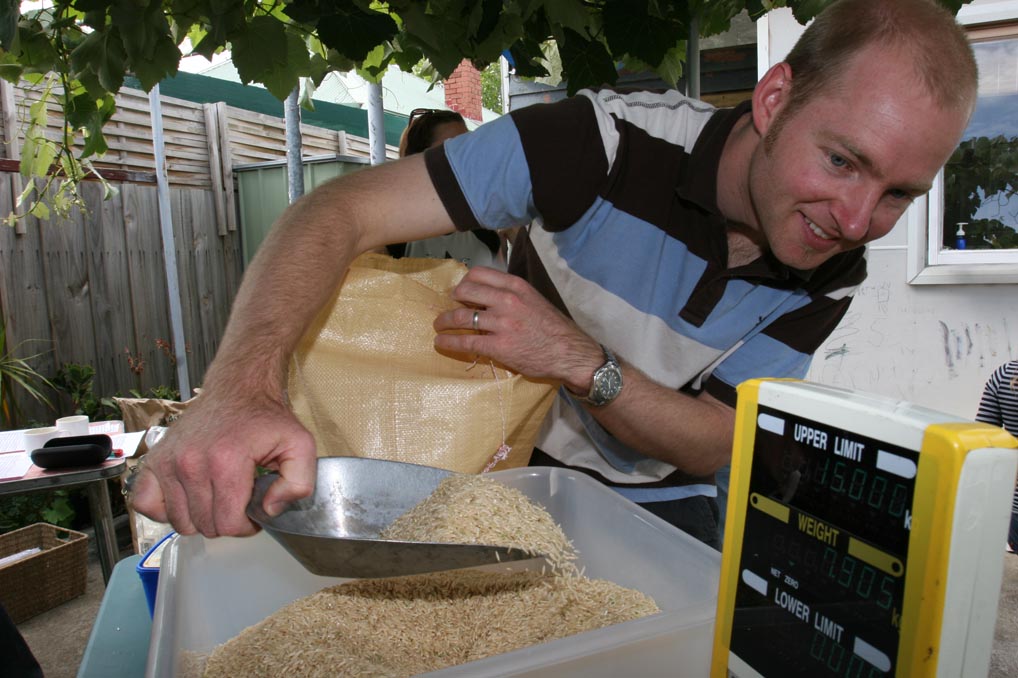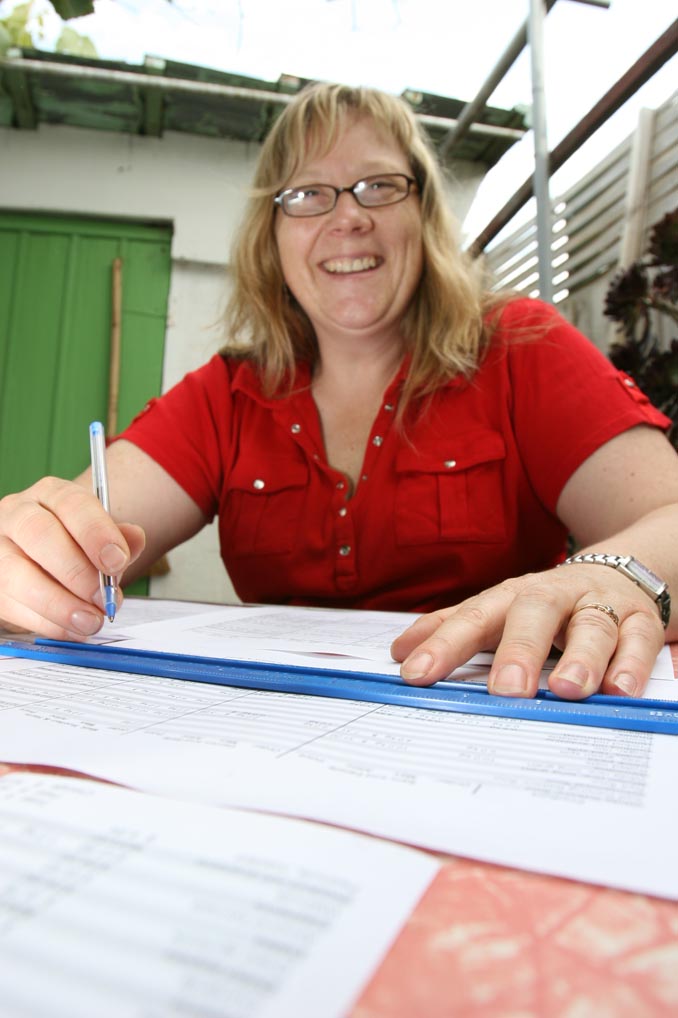 |
|
| Matt measuring rice. |
This morning at breakfast, I considered my diminishing supply of oats and wondered whether it would last me to the upcoming organic dry goods day. As I pour rice for dinner tonight, I notice that my last order will keep me in supply until I am able to re-stock my large 10-litre container. My supply of dates finished a while ago now, so I’ll just be waiting until the next dry goods day to enjoy those yummy treats.
A dry goods order involves a group of households each ordering small amounts of dry goods (i.e. rice, flour, dried fruit, nuts and beans) and collating these orders to be able to buy in bulk quantities. This means we can get good prices on organic foods. A morning is arranged for the weighing and distribution of the order.
While we lived in Footscray for six years, we were members of the Western Organic Collective (WOC). This is a group of households who purchase organic fruit and vegetables at wholesale prices and then work together to sort and distribute the boxes weekly to its members. During our time as WOC members, I took on the role of organising the dry goods days (held four times per year). This gave me the confidence in exploring options for a similar system when we moved to Bendigo 18 months ago. We now have a small, but growing, group of around ten families. I became interested in organising a similar system in Bendigo after our plastic waste increased when we arrived here. I also noticed that my supermarket bill and trolley were both larger.
Reducing our plastic waste is one of my top reasons for buying in bulk. The average Aussie will throw away 200kg of packaging waste ever year. Given the population of Australia, that’s enough waste to fill the Melbourne Cricket Ground nine times over. Most food packaging has one use – we open the bag, consume the food and throw the bag away. A life-span of minutes! The process for making a plastic bag includes taking non-renewable resources (oil) from the earth and producing greenhouse gases to do it. It is estimated that 50 million bags enter the Australian litter stream every year. Once entering the environment, plastic bags take 20 to 1,000 years to break down.
Buying in bulk means I can afford to buy organic foods, which would be otherwise unaffordable for our household. In fact, at times, this is cheaper than buying some items from the supermarket. Organic foods mean that no pesticides and insecticides have been used in production, thereby being better for the earth and my body. This is a practical way in which I can practise faith and care for God’s earth.
The types of foods we order are basically pantry items including rice, flour, dried fruit, nuts, beans/legumes and grains. We are also able to order other specific products that some people may use, such as gluten-free flours or a range of legumes for vegetarians.
The supplier I found to have the widest range of products at reasonable prices is ‘Honest to Goodness’ (www.goodness.com.au). If you live in a major city, there are possibly other suppliers worth investigating. One of my next tasks involves investigating and sourcing local olive oil.
So far, I have held these dry goods days three times per year. This means you order what you need for the four-month period before the next one. In our household, my guesstimating varies: sometimes I run out of the item and sometimes I have over-ordered. This adds to the challenge for me! For example: endeavouring to do without purchasing more sultanas from the supermarket until the next dry goods or working out how can I use all the extra lentils I’ve got! At times, this often leads to sharing recipes with others.
 |
|
| Janet matching distribution to orders. |
The ins and outs of ordering
I send around an email with an order form to those interested three to four weeks prior to the day. Orders are due back within 10-14 days, along with payment. Ordering involves giving your ‘ideal’ volume and your ‘maximum’ volume of the item. I then calculate the bulk amount we can order and how the bulk amount is to be distributed (using a very handy spreadsheet filled with formulas!) There is no minimum order, but orders are usually over the 1kg mark. This system does rely on households being somewhat flexible about what they receive (i.e. we may not have the required orders amongst the group for the bulk amount). The goods are then freighted to my house.
The ins and outs of distribution day
On the day, everyone is present for the weighing of items. Each household brings its own large containers to fill with ordered goods. We purchased a set of commercial scales this year to assist with weighing. Each item is weighed and distributed, requiring a couple of people to help weigh and a person to cross off sorted items from the printed spreadsheet. Everyone chipping in adds to the shared workload. To add to the convivial atmosphere, everyone brings something to share for morning tea and we often have a cuppa during and after the job’s done.
---
I am involved in bulk food ordering for the reasons given above: buying organic, reducing packaging, economic sharing and saving money. In essence, it is a practical way I can live out my faith, a central aspect of this being care for the earth. I thoroughly enjoy the tasks of weighing and sorting on distribution day, because it is a chance to share life and work with others. It gives life to me and the community and means there are tangible connections between us.
Buying food this way means I am less reliant on an unsustainable food system, but, more than that, to quote Wendell Berry, it means I am 'becoming more dependent on my neighbours and friends and this requires more active involvement in my community. More than ever, we need communities that are productive and that work together. Promoting local self-sufficiency means that we become better citizens – local and global'.
